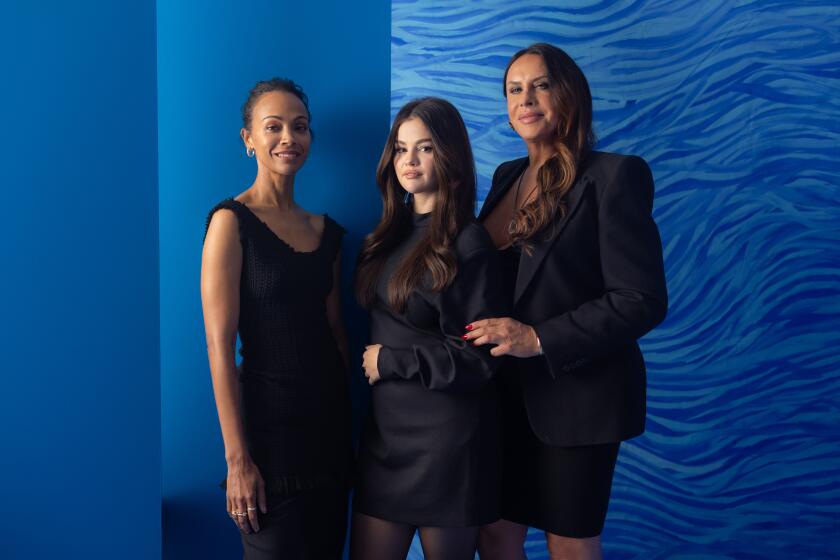And the Oscar Goes to ... the Man in the Back Row for $1 Million
- Share via
For the last 19 years, I have dedicated most of my life to protecting and preserving the work of my father, Orson Welles. His work was the single most important thing in his life, and I loved him more than words could ever say. My other work is supporting and protecting animals. I spent my gypsy childhood traveling with my father around the world, rescuing animals along the way; he loved it and so did I.
My father’s film “Citizen Kane” is considered by many people around the world to be the best film ever made. In 1942, it should have swept the Oscars. Instead, when either my father or “Citizen Kane” were mentioned as nominees, hisses and boos came from the academy members at the Shrine Auditorium -- many of them people who feared William Randolph Hearst. My father refused to attend the ceremony; he knew what would happen, and it hurt him deeply. He won only the best screenplay award that evening, and the academy members knew it was given only so that “Mank” -- Herman J. Mankiewicz, who co-wrote the film -- would take home an Oscar. Imagine, this was the only Academy Award given for the best picture of all time.
My father was given his statuette, and he promptly lost it for many decades. In 1994, I was informed that the Oscar had resurfaced and was about to be sold privately through Sotheby’s. I was astounded that the Oscar had shown up; I believed it stolen and lost for good. I put all my resources together and sued to stop the sale of the statuette. I regained it, and I wanted to put it in a permanent exhibit at an Orson Welles institute, along with his other awards, screenplays, poems and drawings that I have been fortunate enough to accumulate through the years. The institute was my dream, but it never came to pass. I never had the money or the time it takes to organize and run such an establishment. I now realize that it wouldn’t have been a good tribute; my father detested institutions of any kind, which is one of the reasons he never sent me to school and instead hired teachers to tutor me in the various countries in which we lived.
My father should be remembered for what he left: his extraordinary work, which changed the way movies were made. With the immeasurable help and guidance of my advisor, Thomas A. White, and my attorney, Steven Ames Brown, I have been able to protect much of his work. I gave up my career and business for both my father and the animals, which I would do again if given the choice.
Three years ago, I found myself in a very bad financial situation and was forced to think about selling the “Kane” Oscar. I had used most of my personal funds for my animal welfare work, the primary function of which is education in humane animal control in addition to funding individuals and small organizations, many from Third World countries, that have no resources in the work they do for abused and abandoned animals.
Selling a family heirloom seemed far better than losing everything pertaining to my father’s work and seemed necessary to ensure that creditors were paid, although it was the very last thing I ever wanted to do. Even though my father loathed everything that this Oscar represented, deciding to sell it was still one of the most difficult decisions of my life.
A few weeks before the auction was scheduled at Christie’s, the academy’s lawyers tried to stop the sale. I now understand the academy’s dislike of Oscars being sold, but even it admits that a sale does the academy no harm. Simply, I had no alternative left when I made the decision. To lose what I had fought for -- for my father -- would have been appalling; to sell the one thing that had no value to him, but was of great value to others, perhaps was not so bad after all. The academy’s own appraisal in 2002 said the statuette’s value was in the proximity of $1 million.
Despite knowing my predicament and despite knowing it had no right and no basis to stop the Oscar from being sold, the academy obstructed me and forced me to sue to get a judicial decree stating the Oscar was my property. I won that lawsuit at a great emotional price.
I believe academy President Bruce Davis to be a good and responsible man who was very ill advised by his lawyers, who had their own agenda. For a nonprofit organization to spend copious amounts, as it has in this case, is irresponsible and unnecessary to the point of stupidity. Worst of all, its behavior was harmful and morally unacceptable. I was abused and publicly humiliated by the academy’s legal firm in ways that no academy member would ever tolerate.
Now the academy is threatening to appeal unless it is allowed to dictate what I can do with my father’s 1971 Lifetime Achievement Award, his second Oscar.
My father would have thought this normal behavior from academy officials. Let me leave you in no doubt how he felt about them: He hated them. His love was for “films and their makers.” His distrust for people who run media institutions is now even more understandable to me simply because of how I have been treated.
I will continue my work for my father and my work for the animals; my passion for both has not ceased and never will.
More to Read
Only good movies
Get the Indie Focus newsletter, Mark Olsen's weekly guide to the world of cinema.
You may occasionally receive promotional content from the Los Angeles Times.










